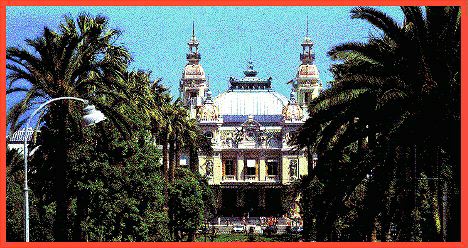
hotels monte carlo



MONTE CARLO
A PARADISE FOR GAMBLERS
When Monte Carlo came into being it was almost called Charlesville or Albertville after the heir to Prince Charles III.
The fact that neither of these names were chosen in the end may have been due to Prince Charles not believing that the new venture would last into his son's reign.
On the other hand he may have liked better the sound of Monte Carlo (Mount Charles) which rolled off the tongue better.
Whatever the reason it was most assuredly an improvement on its old name, Spélugues.
The Prince need not have worried because within three years of setting it up, the casino had earned enough money to ensure it's peoples' loyalty by abolishing direct taxation and military service! It is difficult to credit now that in the middle of the nineteenth century Monaco
was the poorest state in Europe.
Nothing useful could grown on its rocky soil and it barely existed by selling salt and Custom rights to France.
In 1863 however, Francois Blanc, a Frenchman who ran a very successful casino in Germany, heard that the concession was available, and after successfully applying for the 50-year franchise he determined to build as fine and luxurious a casino as existed in Germany.
Furthermore, to make it easier for the moneyed people to visit, he persuaded the French authorities to build a highway alongside the sea.
He called his new company the Société des Bains de Mer et du Cercle des Etrangers
Monaco
.
Later everyone was relieved when the title was shortened to SBM.
Everything was set to go swimmingly after they had obtained the blessing of the church, and this was assured when Cardinal Pecci became one of the shareholders.
Prince Charles himself was promised a guaranteed annual fee, 400 shares and 10% of the profits.
Lord Brougham described Blanc as one of the most capable financiers in Europe.
Certainly he was a man with an eye to the main chance where making money was concerned.
To ingratiate himself with the French government on whom he depended to build the necessary roads and to extend the railway from
Nice
that would open up his new casino to the world, he lent it almost five million francs at a very low rate of interest.
Fortune smiled on him because at that time gambling casinos were forbidden in France, so there was virtually no opposition.
However when the government got wise to the money to be made this way they quickly legalised it.
Monaco however retained the monopoly on roulette tables until as late as 1933.
Thus with the roads built and the railways extended the casino was open for all the world.
Everyone - so long as they had money - was welcome.
All, that is, except the citizens of Monte Carlo itself who were barred from the casino on the anniversary of Blanc's death.
That rule still applies today.
Although regarded by many at the time as thrilling but sinful - Checkov called it "disgusting and contemptible", the casino gained respectability when in 1875 the then Prince and Princess of Wales paid it a visit.
Monte Carlo had arrived! As for Monsieur Blanc, he married a German peasant girl named Marie, thirty years younger than himself, and sent her to Paris to learn to become a lady.
Once again his investment paid off for she bore him two daughters who eventually married real-life princes of the blood.
Writing about Monte Carlo, Liègard referred to it as "where night descends in a robe of light".
If it was good enough for the Prince of Wales it was good enough for the rest of his court, and it soon became fashionable to be seen in Monte Carlo.
In the new Hotel de Paris, boxes containing extravagant ladies' hats had to be admitted sideways so as to get through the doors.
It was here that Crepe Suzette was invented, and it came about entirely by accident.
A clumsy waiter set a pancake alight and his Royal Highness graciously named it after the lady with whom he was dining at the time.
One of the world's most enduring restaurant names - Ciro's - was born here when James Gordon Bennett, heir to the founder of the New York Herald, very angry at having had to wait for service, bought his favourite restaurant and named it Ciro's.
One of the demi-monde ladies won 15 million francs (by today's reckoning) at the casino when she put ten louis on a red which came up 21 consecutive times.
Her long string of lovers included Edward VII, Czar Nicolas II of Russia, King Alfonso XIII of Spain, Leopold II of Belgium, Reza Shah of Persia and William K.
Vanderbilt, and her ample breasts inspired the twin cupolas of the Carlton Hotel in
Cannes
.
Yet for all her gambling wins and undoubted sexual appeal she died in abject poverty in a poorly-furnished room in Nice.

Created, composed, and constructed by Virtual Riviera 1995